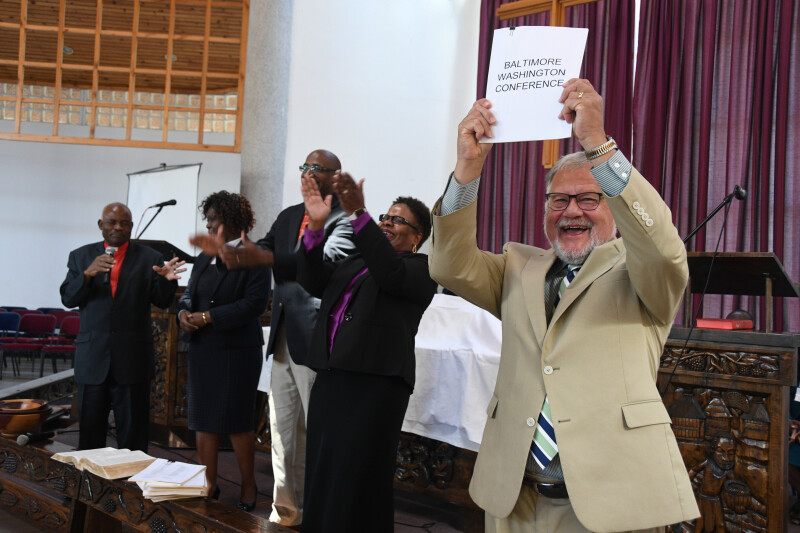Zimbabwe Pastors’ School broadens partnership
By Melissa Lauber
UMConnection Staff
When the Rev. Gladman Kapfumvuti was a young pastor in Marange, Zimbabwe, he lived humbly, traveling a circuit, preaching the Word of God. “Little did I know there were diamonds, literally diamonds, in the dirt beneath my feet,” he said. “I was walking on diamonds.”

Last month, after a 20-year absence, Kapfumvuti, of Asbury UMC in Brandywine, returned to his homeland with a 30-member delegation from the Baltimore-Washington Conference for a Pastors’ School in Zimbabwe, which he helped to launch two decades ago. He was moved by all The United Methodist Church has become, and all the possibilities the school presents.
“There is great richness here,” he said. “The church is sitting on diamonds and we don’t know it.”
More than 400
Daniels helped write the original covenant for the partnership, imagining a school that would provide training in practical theology and ministry best-practices. Over the years, the school has evolved, with leaders in Zimbabwe taking a larger role in the planning and execution of the schools.
Pastors from the BWC are invited to teach and share their expertise. This year, they led classes about the United Methodist Book of Discipline, stewardship, young adult ministries, church school, project management, and disciplined Bible study.
Bishop LaTrelle Easterling, presiding bishop of the BWC, had high praise for the school, which is held every other year.
“The United Methodist Church is a world-wide community, and that global connection was tangibly evidenced through this Pastor’s School,” she said. “Our partnership enhances both conferences as we shared our best practices and expertise to enhance the scholarship of the whole.”
Bishop Easterling also spoke candidly about the need for the world to support the work of Africa
“The world arrives on Africa’s shores and takes, and takes, and takes without regard for the devastating effect this has on the Motherland,” she said. “The BWC is honored to join God’s amazing work at AU and the Zimbabwe Episcopal Area. They are thriving in scholarship and discipleship respectively, and are bringing hope to everyone they touch.”
Bishop Easterling had a unique experience during her first time on the continent. Because Bishop Eben Nhiwatiwa, the episcopal leader of the Zimbabwe Area, had to be in Chicago for a meeting of the Commission on the Way Forward, she was asked to serve as presiding bishop of the Zimbabwe East and West annual conferences in his absence.
In this role, she made history as the first woman bishop of Zimbabwe. (She is also the first woman bishop of the Baltimore-Washington Conference.)
In a private, informal session, Easterling spoke to the conference’s
Both Easterling and Daniels noted an economic undertone in much of the discussions among the clergy.
Recently, amidst a growing cash crisis, Zimbabwe leaders issued a new currency called “bond notes,” which are pegged to, but cannot be converted to, the U.S. dollar, and have no value outside of Zimbabwe.
In Harare, BWC Treasurer Paul Eichelberger had occasion to be out late one night and noted people queuing up at banks for the next morning. People are limited to taking just $20 out of the bank each day, he was told.
The country is facing extreme economic challenges, explained the Rev. Phanuel Razo, who taught part of the stewardship session.
“Unemployment is up to 90 percent, driven by a shrinking economy and hyperinflation,” he said. Some pastors are not receiving salaries, or are being paid in-kind. Other pastors are forced to grow and sell vegetables or do other work to make ends meet.
Each church pays 55 percent of its income to the annual conferences’ common pool, which ensures every pastor gets some compensation. For some smaller churches, this 55 percent totals only $100 a month.
“The church’s sustenance has been put to the test because people no longer have disposable income for tithes and offerings,” Razo said.
Part of the teaching of the Pastors’ School was to help churches develop the means, each within their own context, to “become beacons of hope and promise.”
The Rev. Paul Mazumba has a “small church” of 150 members in the Zimbabwe West Annual Conference. He found many of the sessions “thought-provoking,” he said. “They were very helpful to me. I especially appreciated that they put the material in our context.”
Mazumba chairs the conference’s Board of Discipleship and said he would also like to see more information provided about how to train the laity. He noted that the Western Pennsylvania Annual Conference had led a Laity School at Africa University the week before.
“Shepherds don’t create sheep; sheep create sheep,” he said. “Indeed, the church is growing. But we need to grow more ministries at the local church level. We need to train the laity, too.”
After each hour-long teaching session, the pastors broke into 10 groups for discussion and then reported back with a time of question and answer.
The conversation was lively and many of the pastors said the teaching spurred ideas they are looking forward to implementing in their churches. Others said they were “transformed” and moved by how “vivid” the preaching and teaching was.
When they weren’t teaching, many of the BWC delegation members explored churches and ministries in the Mutare area.
Along the way they visited and began to form relationships at Dora North, Gwese, Zimunya West, Muradzikwa, Hilltop and Nyahuni circuits, and the United Methodist Fairfield Children’s Home.
They talked about the challenges of poverty and the possibilities that come with hope.
At those churches, said Sharon Milton, a laywoman from Emory UMC, “you see God
In the evening debriefings, the BWC delegation discussed the day and explored how greater “paths to partnership” might be created.
Jorge Granados-De La Rosa, a church planter at the former Casa del Pueblo UMC in D.C., noted that the key to the partnership is founded on the concept of “ubuntu,” an African belief in a universal bond of sharing that connects all humanity.
There’s also, Granados noted, a Mayan concept —
This seemingly universal concept also points to the importance of United Methodists reaching out beyond themselves and recognizing the importance of the global church.
Daniels has played a significant role in leading the partnership over the past 20 years — through a variety of joys and challenges. He stresses the two-way nature of sharing and the absolute importance of meaningful relationships.
In Shona, the language of Zimbabwe, there is a word Daniels has taken to heart —
“This partnership is so critical to the people of the Zimbabwe Episcopal Area and the Baltimore-Washington Conference collectively,” Daniels said. “The fact that we intentionally come together for learning at the Pastors’ School and mission work every other year, and for VIM efforts throughout the course of a year, reflects our common commitment to what Zimbabweans in their native language refer to as “
“Chabadza is so prevalent in the school as we teach and learn together and so profound in the communities in which we share mission, that it’s contagious, infectious, and leaves all of us filled with great joy, vigor
Daniels said that he hoped for more
“We have so much to learn from our Zimbabwean partners regarding authentic worship, new church starts, organizing and establishing new faith communities, growing churches and empowering laity for ministry,” he said. “Theirs is a model we can learn from. I look forward to the expanding opportunities that the future will bring to all of us.”
Daniels is delighted at the growth of the School, which is the fulfillment of a vision.
“
“I was tasked by
“It’s truly a God thing. Everyone who has joined the effort... gets swept up into what the Holy Spirit is doing amongst us,” Daniels said.
“Lives are changing, communities are being impacted, pastors and churches are strengthened. The Kingdom of God is being built. I want to continue being a part of that,” he said. “My prayer is that through Bishop Easterling’s leadership and vision, this partnership grows and flourishes to heights we’ve not seen nor could possibly comprehend.”

